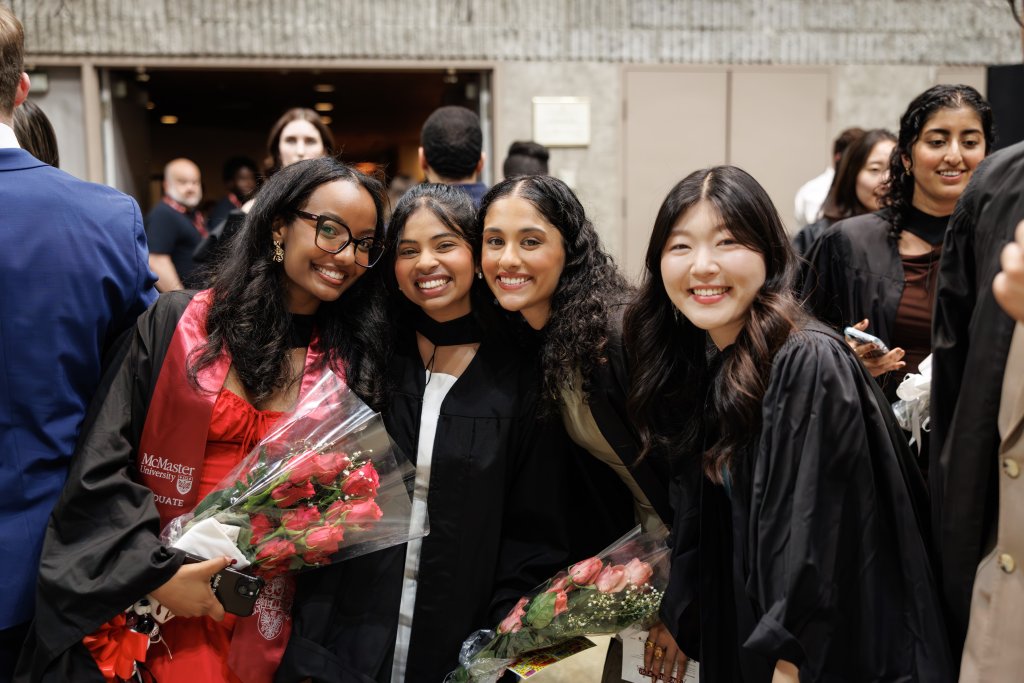 |
Ritika Khetarpal
Ritika Khetarpal is passionate about giving back to the community, and McMaster University has been her home for over the past five years. She strives to inspire others to reach their highest potential through leadership, mentorship, and community engagement. During her undergraduate studies, she contributed to multiple research projects at the Ottawa Heart Institute, the Population Health Research Institute, and McMaster University. She also supported students as a tutor for the McMaster Science Society and as a teaching assistant for the Faculty of Engineering in several sustainability courses. While completing her MSc in Global Health in 2024–2025, Ritika co-founded the McMaster Medical Innovation & Global Health (MIGH) Association, an interdisciplinary graduate association that brings together students from multiple faculties to develop innovative solutions to global health challenges. Alongside her teammates, she won second place in several case competitions over the past year and secured first place in McMaster’s intramural competition, which led to her representing McMaster University and Canada in the Emory Morningside Case Competition in Atlanta, Georgia in March 2025. Beyond campus, Ritika contributed to her community in Brampton West by leading her youth council under the guidance of former Member of Parliament and Cabinet Minister, Kamal Khera. Ritika has also received numerous scholarships and awards including the Outstanding Achievement Award from the Faculty of Health Sciences, which is only given to no more than 5% of students in Master’s or Doctoral programs affiliated with the Faculty. Ritika completed her MSc in Global Health with a specialization in Global Health Management and is now pursuing her MBA at the DeGroote School of Business. |
 |
Dr. Daniel Drucker
Daniel Drucker is an endocrinologist and scientist whose discoveries influence molecular biology, physiology, drug discovery, and clinical investigation. After completing postdoctoral training at Johns Hopkins Hospital, Toronto General Hospital and Massachusetts General Hospital/Harvard University, Dr. Drucker earned appointments as a staff physician at Toronto General Hospital and the University of Toronto’s departments of Medicine, Clinical Biochemistry, Medical Genetics, and Laboratory Medicine & Pathobiology beginning in 1987. In 1991, he was cross-appointed to the staff at Mount Sinai Hospital where he served as deputy director of the Division of Endocrinology and is also senior scientist at the Lunenfeld-Tanenbaum Research Institute. At the University of Toronto, where Dr. Drucker is a University Professor, he has been director of the Division of Endocrinology and director of the Banting and Best Diabetes Centre. Dr. Drucker’s research on a family of hormones called glucagons has revolutionized treatment for people with conditions including type 2 diabetes and obesity by laying the biological foundations for the pharmacological revolution of medicines based on the glucagon-like peptide hormone GLP-1. His discovery of the role of GLP-2 in intestinal barrier function also led to a life-changing treatment for patients with short-bowel syndrome. Dr. Drucker has published his research in 410 articles and 18 book chapters, and has contributed to 33 patents registered in the United States. A fellow of the Royal College of Physicians and Surgeons of Canada, Dr. Drucker has been recognized with dozens of honours in Canada and internationally. He has received, for example, the Canada Gairdner International Award for Biomedical Science, the VinFuture Prize, the BBVA Foundation Frontiers of Knowledge Award, the Harold Hamm International Prize for Diabetes Research, the Novo Nordisk Foundation EASD Prize for Excellence in Diabetes Research, the Wolf Prize in Medicine, and the Helmholtz Diabetes Centre Lifetime Achievement Award. He has been inducted into the Canadian Medical Hall of Fame, elected to the US National Academy of Medicine and been named by Time Magazine as one the world’s 100 most influential people in healthcare and as one of the 100 most influential people. |
 |
Dr. Romina Brignardello-Petersen
Dr. Romina Brignardello-Petersen is an Associate Professor and the Associate Chair, Education, at the Department of Health Research Methods, Evidence, and Impact. Her research and teaching focus on the development and application of methods for evidence synthesis for decision-making, particularly through clinical and public health practice guidelines. In this work, she has supported, collaborated, and provided training for many national and international organizations including the World Health Organization, the Pan-American Health Organization, the Public Health Agency of Canada, the Ministries of Health of Chile and Argentina, and medical groups and societies. Dr. Brignardello-Petersen is training and mentoring the next generation of leaders in her field. She has supervised many graduate students and served in numerous thesis supervisory committees. She was the recipient of the 2025 Excellence in Graduate Supervision Award at the Faculty of Health Sciences. To provide her students with a holistic experience during their programs, Dr. Brignardello-Petersen constantly motivates, supports, and empowers students to lead and participate in as many research, teaching, and mentorship activities as possible. She promotes student autonomy and adapts her supervision style and guidance to match the student’s overall goals, needs, and desired career paths. The work her students do in the space of evidence synthesis and guidelines inculcates the values modelled by Dr. Brignardello-Petersen’s mentors: collaboration, inclusiveness, and respect for everyone – particularly peers and juniors. |
